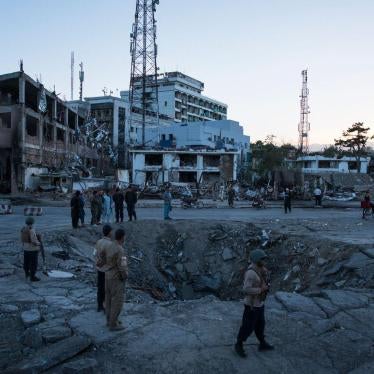(Washington, DC) – Australia’s ratification of the international convention banning cluster bombs can finally proceed following the Senate’s approval on August 21, 2012, but its flawed implementing legislation contains provisions inconsistent with the convention.
The Criminal Code Amendment (Cluster Munitions Prohibition) Bill 2010 passed the Senate without amendment by a vote of 29 to 10. The bill is expected to be signed into law shortly, and then Australia will deposit its instrument of ratification to the Convention on Cluster Munitions with the United Nations and become a state party.
“Thislaw has gaping loopholes that could allow Australian forces to help nations that have not joined the convention – such as the United States – use, transfer, and stockpile a banned weapon,” said Steve Goose, director of the arms division at Human Rights Watch. “How can Australia discourage its allies from using cluster munitions, as the convention requires, if it’s helping them use the weapons?”
Australia should issue clear policy statements that it will not knowingly assist with the use of cluster munitions, and will not grant permission for foreign forces to stockpile cluster munitions on, or transit cluster munitions through, Australian territory, Human Rights Watch said.
The Criminal Code Amendment was introduced in November 2010 and referred to the Senate Committee on Foreign Affairs, Defence and Trade for consideration. In January 2011, Human Rights Watch and two dozen other nongovernmental organizations made submissions requesting strengthening and clarification of key sections of the proposed legislation.
The committee sent the draft legislation forward in March 2011, however, with no recommended changes to the draft legislation. Senator Scott Ludlam of the Australian Greens, a committee member, issued a dissenting report. No further parliamentary action was taken on the legislation until this week.
The Convention on Cluster Munitions was adopted in May 2008 and entered into force and became binding international law for states parties on August 1, 2010. A total of 111 nations have joined the convention, of which 75 have ratified, thus becoming fully bound by its provisions. Under article 9 of the convention, states are required to “take all appropriate legal, administrative and other measures” to implement this convention, including the adoption of penal sanctions to prevent and suppress any activity prohibited by the convention.
Human Rights Watch is a founding member of the international Cluster Munition Coalition, the civil society campaign behind the Convention on Cluster Munitions.






